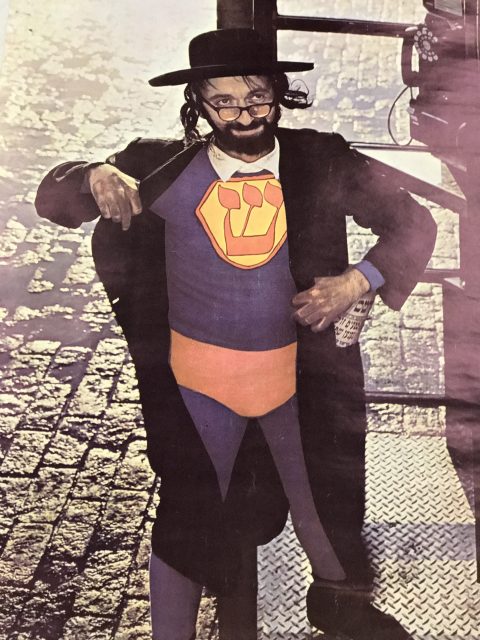Coincidence?
The new Wonder Woman movie stars an Israeli actress – Gal Gadot.
The movie has come out this week – in time for the fiftieth anniversary of the Six Day War.
Fifty summers ago, every Jewish kid on Long Island had the same poster hanging in his or her bedroom.
It was a poster of an ultra-Orthodox man, wearing a Superman costume, with the Hebrew letter shin in place of the S. He is emerging from a phone booth, as Superman once did.
What did that poster mean?
For most of their history, Jews had been Clark Kent – a mild-mannered reporter for a metropolitan newspaper.
But, in early June in 1967, Clark Kent went into the phone booth of history.
When Clark Kent emerged from the phone booth, he had revealed himself to be — a Jewish Superman.
Who was the true “inventor” of that poster?
It was the Zionist thinker, Max Nordau.
For Nordau, Eastern European Jewish men might have been studious, but they were also scrawny, pale, and weak.
Nordau decided that there needed to be a new kind of Jew — a muscular Jew. In fact, that was the origin of the Maccabiah games.
In 1903 and 1905, there were the infamous pogroms in Kishinev. Forty-nine Jews lost their lives and more than five hundred were injured; seven hundred houses were looted and destroyed, and six hundred businesses and shops were looted.
In his poem, “The City of Slaughter,” the modern Hebrew poet, Hayim Nachman Bialik, lamented how:
…Concealed and cowering – the sons of the Maccabees!…
It was the flight of mice they fled,
The scurrying of roaches was their flight…
These Jews were the descendants of the Maccabees – the greatest fighters that Judaism had ever produced.
And they could not fight back?!?
Zionism meant that Jews would no longer be weaklings. In the words of Hans and Franz from SNL: Zionism would “pump you up.”
Back to fifty years ago — during the Six Day War. I am in the middle school cafeteria. A gentile bully approaches me. Usually, he would knock my tray out of my hands.
But, that day would be different. He says to me: “I guess you Jews really know how to fight, after all.”
But, now, look closely at the poster.
Look at the Jew’s hands.
The Jew’s hands are dirty.
There are three interpretations.
The first possibility: the Jews’ hands are dirty from working the land.
Maybe, but I doubt it.
The second possibility: the poster is anti-Semitic.
Jews with dirty hands is a classic anti-Semitic image — going back to Shylock and Fagin in Oliver Twist.
But, why would “Super Jew” have dirty hands?
Because, some people believed — and believe — that Israel had waged an aggressive war.
Whatever else might have ensued after the war — the occupation, the settlements, etc. — in June, 1967, it didn’t look that way.
Israel’s survival was at risk. Israelis dug mass graves in Tel Aviv, preparing for the grisly possibility of untold numbers of casualties.
There is a third interpretation of the Jew’s dirty hands.
History lesson: Why did some Jews not support Zionism?
- Some classical Reform Jews were anti-Zionist, because they were afraid of accusations of dual loyalty.
- Some ultra-Orthodox Jews were (and are) anti-Zionist — because only a divinely-sent Messiah can restore Jewish sovereignty.
But there has been another reason why some Jews have been less than gung ho about Zionism.
If you have political power, and if you have military power, that means that you get your hands dirty. Judaism means living above and beyond the domain of earthly affairs. It means living in the spirit. It means living in the mind.
Rabbi Abraham Isaac Kook was the first chief rabbi of the yishuv (pre-State Palestine).
And yet, even he had misgivings about the necessity of Jewish power:
“It is not good for the children of Jacob to engage in political life at a time when statehood requires bloody ruthlessness and demands a talent for evil.”
There is an emerging style of Jewish remembrance of the Six Day War — a 24/6 shiva for, to quote Don Henley, “the end of the innocence.”
Israel is not innocent. No nation can be. That is the way of the world.
The fact remains: had Israel lost the 1967 war, it would have been destroyed.
Imagine if the Arabs had won, and there had been Jewish refugee camps in Jordan.
Would there have been op-eds in the Arab press — calling for compassion and justice for Jewish refugees?
On the other hand, consider the biblical story of Samson.
Yes, he had great power.
But at the end, his power did not matter. He had become blind.
Israel does not have the luxury of abandoning power.
But, also, Israel does not have the luxury of abandoning its vision — for a better Israel, and for a better world.
May the next fifty years teach us how to balance those two elements of the Jewish spirit.
Israel cannot live without power.
But neither can it survive without vision.






